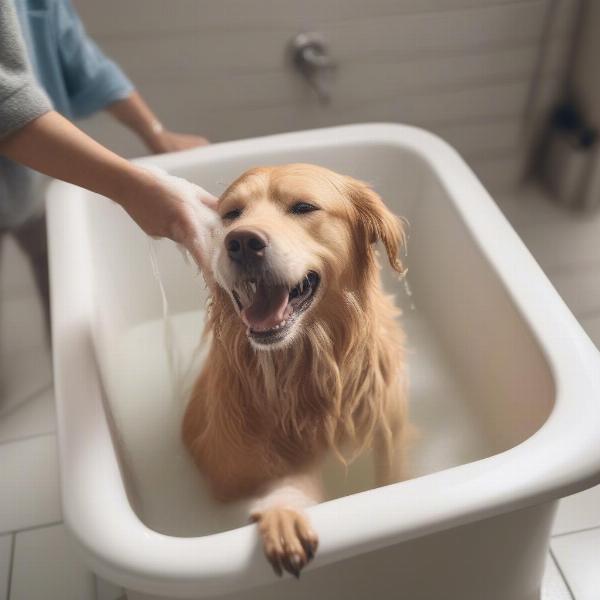Dog stink spray, whether it’s from anal glands, urine marking, or just a general musty odor, can be a real challenge for dog owners. Understanding the causes of these unpleasant smells is the first step towards effectively addressing them. This article will explore the various reasons why your dog might be emitting a foul odor and provide practical solutions to help you eliminate the stink and keep your furry friend smelling fresh.
Why Does My Dog Stink?
Several factors contribute to that distinctive “dog smell.” From rolling in something unpleasant outdoors to underlying medical conditions, identifying the source is crucial. Common culprits include:
- Anal Gland Issues: These small sacs near the rectum release a foul-smelling fluid during defecation. If they become impacted or infected, they can cause a persistent fishy or metallic odor.
- Skin Infections: Bacterial or fungal infections can create a musty, unpleasant smell. Allergies are a common trigger for skin issues that lead to odor.
- Ear Infections: A yeasty or foul odor emanating from the ears often indicates an infection.
- Dental Problems: Bad breath can be a sign of dental disease, which can also contribute to overall body odor.
- Urinary Tract Infections (UTIs): UTIs can cause strong-smelling urine, which can linger on your dog’s fur.
- Rolling in Unpleasant Substances: Dogs have a peculiar habit of rolling in things we find repulsive, from dead animals to garbage.
Tackling the Stink: Effective Solutions
Once you’ve pinpointed the source of the odor, you can take steps to eliminate it. Here are some effective solutions:
- Regular Bathing: Bathing your dog with a dog-specific shampoo can significantly reduce odor. However, avoid over-bathing, as it can strip their skin of natural oils.
- Anal Gland Expression: If anal gland issues are the culprit, your veterinarian can express them. In some cases, dietary changes can also help.
- Veterinary Care: For skin, ear, and urinary tract infections, a visit to the vet is essential. They can prescribe appropriate medications to address the underlying condition.
- Dental Hygiene: Regular brushing and professional cleanings can prevent dental disease and associated bad breath.
- Dietary Adjustments: Certain foods can exacerbate skin allergies and contribute to odor. Your vet can recommend hypoallergenic diets if needed.
 Dog Getting a Bath
Dog Getting a Bath
Preventing Future Stink
Prevention is always better than cure. Here are some proactive measures to keep your dog smelling fresh:
- Regular Grooming: Brushing your dog regularly helps remove loose hair and dirt, which can contribute to odor.
- Ear Cleaning: Regular ear cleaning can prevent infections and associated smells.
- Healthy Diet: A balanced diet supports healthy skin and coat, reducing the likelihood of skin problems and odor.
- Environmental Cleaning: Regularly cleaning your dog’s bedding and living areas can eliminate odor-causing bacteria.
Conclusion
Dog stink spray can be a nuisance, but by understanding the causes and implementing appropriate solutions, you can effectively manage and prevent it. Regular grooming, veterinary care when necessary, and a proactive approach to hygiene will ensure your canine companion stays fresh and clean.
FAQ
- How often should I bathe my dog? Generally, bathing every 4-8 weeks is sufficient, but this can vary depending on breed and lifestyle.
- What are the signs of impacted anal glands? Scooting, excessive licking of the anal area, and a foul fishy odor are common signs.
- Can I express my dog’s anal glands myself? It’s best to leave this to a veterinarian to avoid injury.
- What causes a yeasty smell in a dog’s ears? Yeast infections are a common cause of ear odor in dogs.
- How can I prevent my dog from rolling in smelly things? Training and consistent redirection can help curb this behavior.
- Is there a dog stink spray remover I can use on furniture? Yes, there are enzymatic cleaners specifically designed to eliminate pet odors.
- What should I do if my dog suddenly develops a strong odor? Consult your veterinarian to rule out any underlying medical conditions.
signs your dog needs a bath
dogs urine stinks
how to get dog smell out of rug
how to get rid of dog smell on rug
About ILM Dog
ILM Dog is your go-to resource for expert advice on dog care, encompassing breed selection, health, training, nutrition, grooming, and much more. We offer practical tips and insights to help you provide the best possible care for your furry friend. Whether you’re a seasoned dog owner or just starting your journey, ILM Dog provides trustworthy information to empower you to make informed decisions. For inquiries or assistance, please contact us at [email protected] or call us at +44 20-3965-8624. Visit us online at ILM Dog.